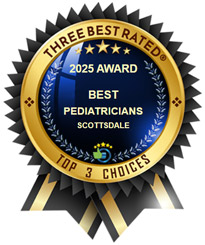Mumps Treatment for Children in Scottsdale and Glendale, AZ
Mumps is a contagious viral infection commonly affecting children and adolescents, characterized by swelling of the salivary glands, particularly the parotid glands. While often mild, mumps can lead to complications such as meningitis or orchitis, making vaccination an important preventive measure. For more information, please contact us or book an appointment online. We Have two Pediatric Clinics in Scottsdale, AZ & Glendale, AZ.




Table of Contents:
How serious are mumps in kids?
What are the symptoms of mumps?
What age group is most at risk for mumps?
What to do if a child has mumps?
Mumps is a highly contagious viral infection that can lead to a range of complications in children. While many cases are mild and self-limiting, mumps can sometimes cause serious health issues, such as meningitis, encephalitis, pancreatitis, orchitis, and hearing loss.
The most effective way to prevent mumps is through vaccination. The MMR (measles, mumps, and rubella) vaccine is administered to children in two doses: the first dose at 12 to 15 months of age and the second dose at 4 to 6 years of age. The vaccine is highly effective and has significantly reduced the incidence of mumps and its complications.
While many children recover from mumps without serious issues, the potential for complications makes this condition a serious concern. Your child’s pediatrician can guide preventive measures as well as proper care to minimize the risk of complications.
Some of the most commonly reported symptoms of mumps in children include:
• Pain and swelling in the salivary glands – The hallmark symptom of mumps is the painful swelling of the salivary glands, specifically the parotid glands located just below and in front of the ears.
• Difficulty talking or chewing – Swelling and pain in the salivary glands can make it difficult for children to talk, chew, or swallow. This discomfort often worsens with eating and drinking.
• Headache or earache – Children with mumps frequently experience headaches or earaches due to the swelling and inflammation in the salivary glands.
• Fever – A moderate-to-high fever is common in children with mumps.
• Loss of appetite – Due to the discomfort associated with chewing and swallowing, children with mumps often experience a decrease in appetite.
• Fatigue – Mumps can cause your child to feel unusually tired. This overall sense of malaise often lasts throughout the illness.
• Muscle aches – Muscle aches and general body pain are common symptoms of mumps.
In severe cases, mumps can cause confusion and seizures. If you notice any of these symptoms in your child, you should consult your pediatrician regarding how to alleviate their discomfort and prevent complications.
Children between the ages of 2 and 12 are at the highest risk of contracting mumps. This age group is the most susceptible due to their increased exposure to environments where the virus can spread easily, such as schools and daycare centers.
Furthermore, individuals who have not been vaccinated with the MMR vaccine are also at high risk, regardless of their age. While mumps used to be a very common childhood illness, after the introduction of the mumps vaccine in 1967, the number of cases has reduced substantially.
It’s important to get vaccinated to protect yourself and your loved ones from this preventable disease. When you visit your child’s pediatrician, you can learn more about mumps prevention. While mumps is quite rare, outbreaks occur in the United States regularly, so it’s important to be prepared.
If your child has symptoms of mumps, it’s important to consult their pediatrician promptly. Mumps is highly contagious, so you should keep your child isolated from others to prevent the virus from spreading. This includes keeping them away from school, daycare, and social activities until the pediatrician gives the all-clear.
Typically, symptoms of mumps last for two to three weeks. During this time, you should ensure your child gets plenty of rest and stays hydrated. Offer fluids and soft foods that are easy to swallow, as mumps can make chewing and swallowing painful.
Applying cold compresses to the swollen salivary glands can help reduce pain and swelling. Furthermore, over-the-counter pain relievers, such as acetaminophen or ibuprofen, can be used to reduce fever and discomfort. To prevent the spread of mumps, you should teach your child good hygiene practices, such as frequent handwashing and covering the mouth and nose when coughing or sneezing. For more information, please contact us or book an appointment online. We Have 2 Pediatric Clinics in Scottsdale, AZ & Glendale, AZ. We serve patients from Glendale AZ, Peoria AZ, Sun City AZ, Scottsdale AZ, North Scottsdale AZ, Grayhawk AZ, and surrounding areas of Phoenix AZ.

Additional Services You May Need

Additional Services You May Need









